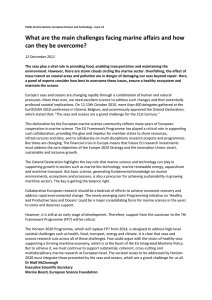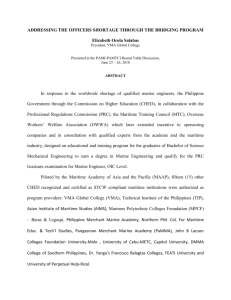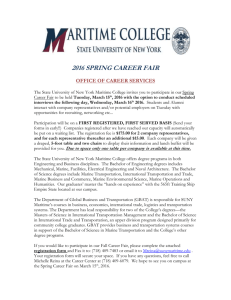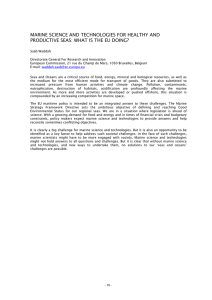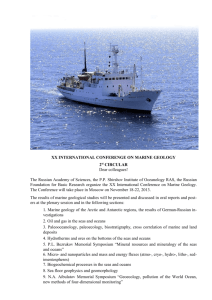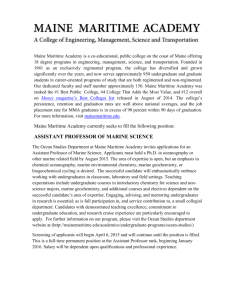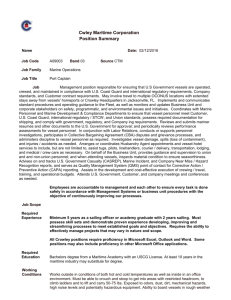EUROPEAN COMMISSION I RECOMMENDATIONS
advertisement
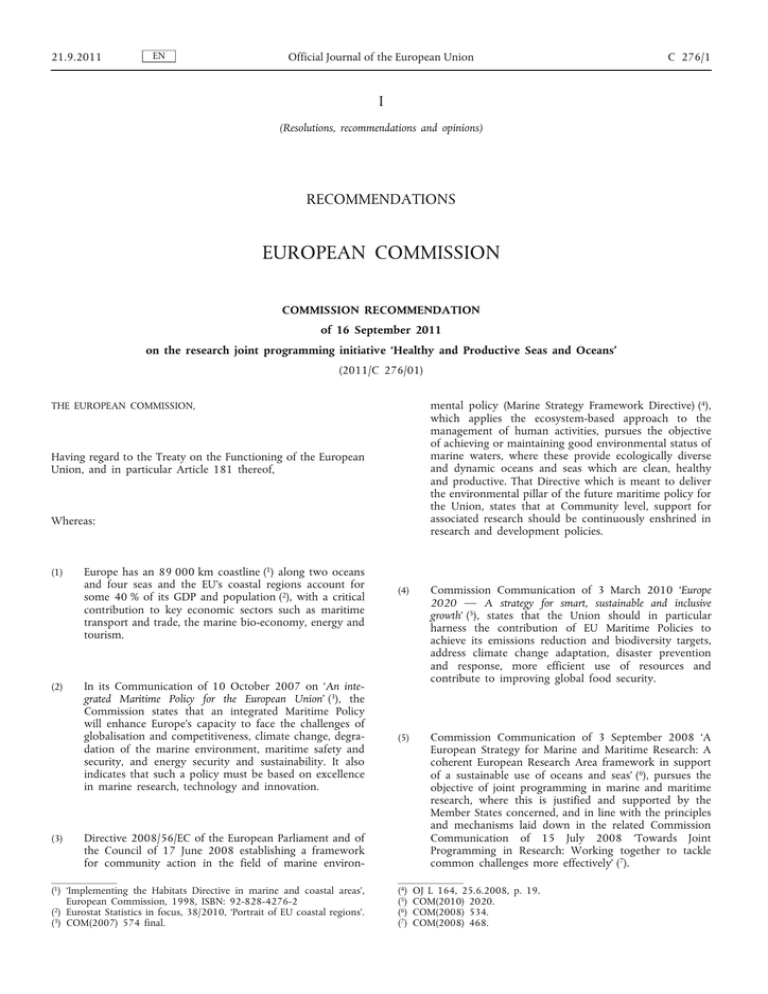
21.9.2011 EN Official Journal of the European Union C 276/1 I (Resolutions, recommendations and opinions) RECOMMENDATIONS EUROPEAN COMMISSION COMMISSION RECOMMENDATION of 16 September 2011 on the research joint programming initiative ‘Healthy and Productive Seas and Oceans’ (2011/C 276/01) mental policy (Marine Strategy Framework Directive) (4), which applies the ecosystem-based approach to the management of human activities, pursues the objective of achieving or maintaining good environmental status of marine waters, where these provide ecologically diverse and dynamic oceans and seas which are clean, healthy and productive. That Directive which is meant to deliver the environmental pillar of the future maritime policy for the Union, states that at Community level, support for associated research should be continuously enshrined in research and development policies. THE EUROPEAN COMMISSION, Having regard to the Treaty on the Functioning of the European Union, and in particular Article 181 thereof, Whereas: (1) (2) (3) Europe has an 89 000 km coastline (1) along two oceans and four seas and the EU’s coastal regions account for some 40 % of its GDP and population (2), with a critical contribution to key economic sectors such as maritime transport and trade, the marine bio-economy, energy and tourism. In its Communication of 10 October 2007 on ‘An inte grated Maritime Policy for the European Union’ (3), the Commission states that an integrated Maritime Policy will enhance Europe’s capacity to face the challenges of globalisation and competitiveness, climate change, degra dation of the marine environment, maritime safety and security, and energy security and sustainability. It also indicates that such a policy must be based on excellence in marine research, technology and innovation. (4) Commission Communication of 3 March 2010 ‘Europe 2020 — A strategy for smart, sustainable and inclusive growth’ (5), states that the Union should in particular harness the contribution of EU Maritime Policies to achieve its emissions reduction and biodiversity targets, address climate change adaptation, disaster prevention and response, more efficient use of resources and contribute to improving global food security. (5) Commission Communication of 3 September 2008 ‘A European Strategy for Marine and Maritime Research: A coherent European Research Area framework in support of a sustainable use of oceans and seas’ (6), pursues the objective of joint programming in marine and maritime research, where this is justified and supported by the Member States concerned, and in line with the principles and mechanisms laid down in the related Commission Communication of 15 July 2008 ‘Towards Joint Programming in Research: Working together to tackle common challenges more effectively’ (7). Directive 2008/56/EC of the European Parliament and of the Council of 17 June 2008 establishing a framework for community action in the field of marine environ (1) ‘Implementing the Habitats Directive in marine and coastal areas’, European Commission, 1998, ISBN: 92-828-4276-2 (2) Eurostat Statistics in focus, 38/2010, ‘Portrait of EU coastal regions’. (3) COM(2007) 574 final. (4 ) (5 ) (6 ) (7 ) OJ L 164, 25.6.2008, p. 19. COM(2010) 2020. COM(2008) 534. COM(2008) 468. C 276/2 (6) (7) (8) (9) (10) EN Official Journal of the European Union At its meeting of 26 May 2010, the Competitiveness Council recognised ‘Healthy and Productive Seas and Oceans’ as an area where joint programming would provide a major added value to the current, fragmented efforts of Member States in the field of research (1). It therefore adopted conclusions recognising the need to launch a joint programming initiative on the subject and inviting the Commission to contribute to its prep aration. The Council also reaffirmed that joint programming is a process led by Member States, with the Commission acting as a facilitator. The analysis of national research activities outlined in the staff working document confirms that there is a need for better coor dination to increase effectiveness and impact of research as well as to avoid duplication through the development of a common strategic research agenda. Participating countries have confirmed their participation in such a Joint Programming Initiative by the sending of formal commitment letters. Joint programming of research on marine and maritime issues would provide for coordination of research in that area, contributing significantly to the construction of an operational European Research Area on seas and oceans, enabling the sustainable use of their existing and untapped resources, strengthening Europe’s leadership and competitiveness of maritime industries, while protecting the marine environment and adapting to climate change impacts. In order to achieve the goals set by this Recommen dation, Member States should cooperate with the Commission on exploring possible Commission initiatives to assist Member States with developing and implementing the strategic research agenda. In order for the Commission to be able to report to the European Parliament and to the Council, Member States should report regularly to the Commission on the progress made on this joint programming initiative, 21.9.2011 2. Member States are encouraged to adopt a common strategic research agenda establishing medium to long-term research needs and objectives in the area of seas and oceans research. The strategic research agenda should contain an implemen tation plan establishing priorities and timelines and spec ifying the action, instruments and resources required for its implementation. 3. Member States are encouraged to include the following actions, as part of the strategic research agenda and of the implementation plan: (a) completing identification and exchange of information on relevant national programmes, research activities and capacities; (b) reinforcing joint foresight exercise and technology assessment capacities; (c) exchanging information, resources, methodologies and guidelines; best practices, (d) identifying areas or research activities that would benefit from coordination or, where appropriate joint calls for proposals or pooling of resources; (e) defining the modalities for research to be undertaken jointly in the areas referred to in point (d); (f) sharing, where appropriate, existing research infra structures or developing in a coordinated way new facilities such as marine observation infrastructures as well as the development of models and applications for identified needs; (g) encouraging better collaboration between public and private sectors, as well as open innovation between different research activities and business sectors related to marine observation, marine resources and maritime activities; HAS ADOPTED THIS RECOMMENDATION: 1. Member States are encouraged to update as needed their common vision on how cooperation and coordination in the field of research at Union level can contribute to meeting the challenge of keeping seas and oceans healthy and productive and maximising the opportunities they offer (2). (1) 10246/10. (2) http://www.jpi-oceans.eu (h) promoting interdisciplinary approaches and stimulating exchanges and interactions across the marine and maritime sectors; (i) developing appropriate science/policy interfaces on relevant issues such as the implementation of Directive 2008/56/EC and of Maritime Spatial Planning as an essential objective of the Communication on ‘An inte grated Maritime Policy for the European Union’. 21.9.2011 EN Official Journal of the European Union 4. Member States are encouraged to set up an efficient common management structure in the field of seas and oceans research, with a mandate to establish common conditions, rules and procedures for cooperation and coor dination and to monitor the implementation of the strategic research agenda. 5. Member States are encouraged to jointly implement the strategic research agenda including via their national research programmes or other national research activities, in accordance with the guidelines for Framework Conditions on Joint Programming developed by the Council High Level Group on Joint Programming (1). 6. Member States are encouraged to cooperate with the Commission with a view to exploring possible initiatives to assist Member States in developing and implementing (1) ERC-GPC 1311/10. Joint Programming in research 2008-2010 and beyond — Report of the High Level Group on Joint Programming to the Council of 12 November 2010 — Annex II. C 276/3 the strategic research agenda, and to coordinating the joint programmes with other Union initiatives in this field, in particular marine and maritime European Research Area Networks and the Joint Baltic Sea Research and Development Programme (BONUS). 7. Member States are encouraged to report regularly to the Commission on the progress made on this joint programming initiative through annual progress reports. Done at Brussels, 16 September 2011. For the Commission Máire GEOGHEGAN-QUINN Member of the Commission
